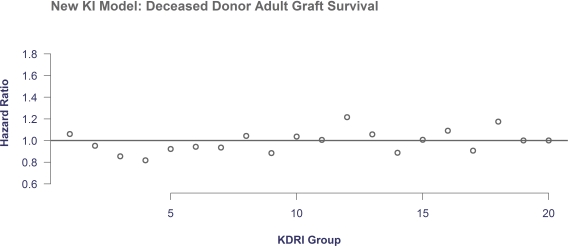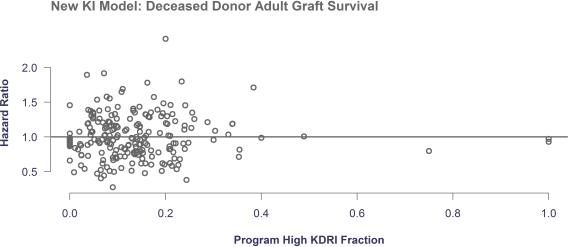The Effects of High-Risk Donors and Recipients on Scientific Registry of Transplant Recipients Program-Specific Outcomes
1Scientific Registry of Transplant Recipients, Minneapolis Medical Research Foundation, Minneapolis, MN
2Quantitative Health Sciences, Cleveland Clinic, Cleveland, OH.
Meeting: 2015 American Transplant Congress
Abstract number: 63
Keywords: Kidney transplantation, Public policy, Risk factors
Session Information
Session Name: Concurrent Session: Regulatory Issues in Transplant Administration
Session Type: Concurrent Session
Date: Sunday, May 3, 2015
Session Time: 2:15pm-3:45pm
 Presentation Time: 2:27pm-2:39pm
Presentation Time: 2:27pm-2:39pm
Location: Room 118-C
Public reporting of transplant program-specific outcomes may dissuade programs from accepting high-risk donors and recipients, and thereby restrict access to transplant. It has been proposed that recipients of high-risk donors or high-risk transplants, as identified by the combination of donor and recipient risk, be excluded from program-specific evaluation cohorts. We examined the association between measured donor and recipient risk and 1-year outcomes evaluations by the Scientific Registry of Transplant Recipients (SRTR) for adult deceased donor kidney graft survival. We used adult deceased donor kidney transplants 1/1/11-6/30/13 and the newly-developed kidney risk-adjustment models to be used starting in 2015, along with the new Bayesian methodology for identifying low-performing programs. We defined low- and high-risk donors by kidney donor profile index ≤85% and >85%, respectively, and the combined donor/recipient risk as low (≤85th percentile) and high (>85th percentile) based on modeled risk. After risk adjustment, there was no relationship between donor risk and outcomes evaluations (Figure 1). There was also no relationship between the proportion of high-risk donors that programs accepted and their program evaluations (Figure 2).
There was also no relationship between the proportion of high-risk donors that programs accepted and their program evaluations (Figure 2). In addition, there were currently no programs identified solely because of poor outcomes with high-risk donors. Results were similar when considering the combination of donor-recipient risk. As defined by current risk-parameters, high-risk donors and recipients do not adversely affect SRTR evaluations. Whether unmeasured risk significantly affects outcomes deserves continued consideration.
In addition, there were currently no programs identified solely because of poor outcomes with high-risk donors. Results were similar when considering the combination of donor-recipient risk. As defined by current risk-parameters, high-risk donors and recipients do not adversely affect SRTR evaluations. Whether unmeasured risk significantly affects outcomes deserves continued consideration.
To cite this abstract in AMA style:
Snyder J, Salkowski N, Zaun D, Schold J, Israni A, Kasiske B. The Effects of High-Risk Donors and Recipients on Scientific Registry of Transplant Recipients Program-Specific Outcomes [abstract]. Am J Transplant. 2015; 15 (suppl 3). https://atcmeetingabstracts.com/abstract/the-effects-of-high-risk-donors-and-recipients-on-scientific-registry-of-transplant-recipients-program-specific-outcomes/. Accessed July 3, 2025.« Back to 2015 American Transplant Congress
